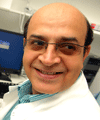|
âWeâre very excited about this discovery, particularly as our earlier work in mice suggests that we could develop this work even further."
|
|
Key Points of this article
|
|
Genetic markers showed the presence of partly-developed sperm cells called spermatagonial stem cells, which are an early phase of the male germ cell development.
|
|
|
|
|
Main results
|
|
In most men, spermatagonial cells eventually develop into mature, functional sperm but this progression was not achieved in this experiment.
|
|
|
Professor Karim Nayernia
|
|
Prof Nayernia gained worldwide acclaim in July 2006 when he announced in the journal Developmental Cell that he and colleagues had created sperm cells from mouse embryonic stem cells and used these to fertilise mice eggs, resulting in seven live births.
|
|
By NESCI,
[RxPG] Human bone marrow has been used to create early-stage sperm cells for the first time, a scientific step forward that will help researchers understand more about how sperm cells are created.
For the experiment, Prof Nayernia and his team took bone marrow from male volunteers and isolated the mesenchymal stem cells. These cells have previously been found to grow into other body tissues such as muscle.
They cultured these cells in the laboratory and coaxed them into becoming male reproductive cells, which are scientifically known as âgerm cellsâ.
Genetic markers showed the presence of partly-developed sperm cells called spermatagonial stem cells, which are an early phase of the male germ cell development. In most men, spermatagonial cells eventually develop into mature, functional sperm but this progression was not achieved in this experiment.
The research was carried out in Germany. Prof Nayernia is continuing with this work at NESCI, which has just opened a suite of new laboratories at the Cente for Life in Newcastle.
Earlier research led by Prof Nayernia using mice, published in Laboratory Investigations, also created spermatagonial cells from mouse bone marrow. The cells were transplanted into mouse testes and were observed to undergo early meiosis - cell division - the next stage to them becoming mature sperm cells, although they did not develop further.
Talking about his newly published research paper, Prof Nayernia said : âWeâre very excited about this discovery, particularly as our earlier work in mice suggests that we could develop this work even further.
âOur next goal is to see if we can get the spermatagonial stem cells to progress to mature sperm in the laboratory and this should take around three to five years of experiments. Iâll be collaborating with other NESCI scientists to take this work forward.
 |
| Professor Karim Nayernia |
Prof Nayernia says a lengthy process of scientific investigation is required within a reasonable ethical and social framework to be able to take this work to its next stage or to say if it has potential applications in terms of fertility treatments in humans.
Prof Nayernia gained worldwide acclaim in July 2006 when he announced in the journal Developmental Cell that he and colleagues had created sperm cells from mouse embryonic stem cells and used these to fertilise mice eggs, resulting in seven live births.
Publication:
Research paper reference: N. Drusenheimer, Wulf, G., Nolte, J., Lee, J.H., Dev, A., Dressel, R., Gromoll, J., Schmidtke, J., Engel, W. and Nayneria, K. (2007) Putative human male germ cells from bone marrow stem cells. In: Gamete Biology: Emerging Frontiers on Fertility and Contraceptive Development (SRF 63) (S.K. Gupta, K. Koyama and J.F. Murray Eds). Nottingham University Press, Nottingham, England. pp. 69-76. 
On the web:
www.nesci.ac.uk 
|
Advertise in this space for $10 per month.
Contact us today.
|
 |
|
Subscribe to Stem Cell Research Newsletter
|
|
|
|
About Dr. Venkat Yelamanchili
|
This news story has been reviewed by Dr. Venkat Yelamanchili before its publication on RxPG News website. Dr. Venkata Yelamanchili , MBBS is a editor of RxPG News. In his capacity as the editor, he is responsible for content related to latest research news in psychiatry. His areas of special interest are General Psychiatry and Therapeutic communities.
RxPG News is committed to promotion and implementation of Evidence Based Medical Journalism in all channels of mass media including internet.
|
|
Additional information about the news article
|
The research published today (Friday, April 13 2007), in the academic journal Reproduction: Gamete Biology, was led by Professor Karim Nayernia (pictured), formerly of the University of Göttingen in Germany but now of Newcastle Univesity and the North-east England Stem Cell Institute (NESCI). The North-east England Stem Cell Institute (NESCI) draws together Durham and Newcastle Universities, the Newcastle-upon-Tyne Hospitals NHS Foundation Trust and other partners in a unique interdisciplinary collaboration to convert stem cell research and technologies into cost-effective, ethically-robust 21st century health solutions to ameliorate degenerative diseases, the effects of ageing and serious injury. The Institute has received substantial funding and other support from the Regional Development Agency, One NorthEast, and is partly based at the Centre for Life in Newcastle.â
|
|
Feedback
|
For any corrections of factual information, to contact the editors or to send
any medical news or health news press releases, use
feedback form
|
Top of Page
|



